The Coalition against Typhoid’s activities are guided by a multi-stakeholder steering committee, currently chaired by Steve Luby, Professor of Infectious Diseases and Director of Research for Stanford’s Center for Innovation in Global Health. The committee meets quarterly and provides strategic direction and oversight to the Coalition.
Steve Luby, Stanford University
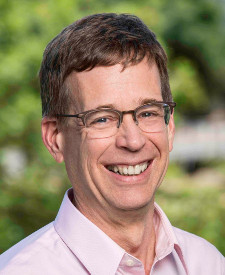 Steve Luby, MD is a physician and epidemiologist. He lived in Karachi, Pakistan for 5 years and Dhaka, Bangladesh for 8 years working with local researchers to broaden understanding of exposure pathways and disease burden of infectious diseases, including typhoid, and developing interventions to reduce that burden. In 2012 Dr. Luby joined Stanford University as a Professor of Infectious Diseases and Director of Research for Stanford’s Center for Innovation in Global Health. He is a Senior Fellow at Stanford’s Woods Institute for the Environment and at Stanford’s Freeman Spogli Institute for International Studies. In 2009 Dr. Luby was awarded the inaugural Oklahoma University International WaTER Prize in recognition of his contributions in the field of water supply and sanitation with a focus on the world’s poorest. Dr. Luby has mentored 41 scientists from low income countries to publish their initial first-authored manuscript in a peer reviewed international scientific journal; he has authored over 300 scientific articles.
Steve Luby, MD is a physician and epidemiologist. He lived in Karachi, Pakistan for 5 years and Dhaka, Bangladesh for 8 years working with local researchers to broaden understanding of exposure pathways and disease burden of infectious diseases, including typhoid, and developing interventions to reduce that burden. In 2012 Dr. Luby joined Stanford University as a Professor of Infectious Diseases and Director of Research for Stanford’s Center for Innovation in Global Health. He is a Senior Fellow at Stanford’s Woods Institute for the Environment and at Stanford’s Freeman Spogli Institute for International Studies. In 2009 Dr. Luby was awarded the inaugural Oklahoma University International WaTER Prize in recognition of his contributions in the field of water supply and sanitation with a focus on the world’s poorest. Dr. Luby has mentored 41 scientists from low income countries to publish their initial first-authored manuscript in a peer reviewed international scientific journal; he has authored over 300 scientific articles.
Adwoa Bentsi-Enchill, World Health Organization
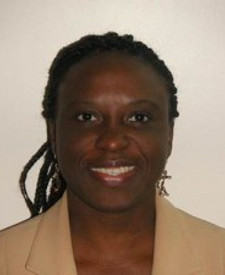 Dr. Adwoa Bentsi-Enchill is a Medical Officer in the Department of Immunization, Vaccines and Biologicals of the World Health Organization, Geneva where she currently leads WHO’s activities aimed at reviewing the evidence to support a revised global policy on typhoid vaccine use and to support national level decision-making for typhoid conjugate vaccine introduction in endemic countries. Dr Bentsi-Enchill’s previous work in WHO focused on immunization safety and she has over 14 years of experience in international health including technical support to immunization and other public health programmes in several countries across WHO’s six regions. Prior to joining WHO, Dr. Bentsi-Enchill worked as an epidemiologist in Health Canada (now Public Health Agency of Canada) from 1994 to 2000 and gained significant experience in public health programmes, field epidemiology, and various fields of immunization, including key roles in polio and acute flaccid paralysis surveillance, vaccine coverage monitoring, vaccine effectiveness studies and immunization safety.
Dr. Adwoa Bentsi-Enchill is a Medical Officer in the Department of Immunization, Vaccines and Biologicals of the World Health Organization, Geneva where she currently leads WHO’s activities aimed at reviewing the evidence to support a revised global policy on typhoid vaccine use and to support national level decision-making for typhoid conjugate vaccine introduction in endemic countries. Dr Bentsi-Enchill’s previous work in WHO focused on immunization safety and she has over 14 years of experience in international health including technical support to immunization and other public health programmes in several countries across WHO’s six regions. Prior to joining WHO, Dr. Bentsi-Enchill worked as an epidemiologist in Health Canada (now Public Health Agency of Canada) from 1994 to 2000 and gained significant experience in public health programmes, field epidemiology, and various fields of immunization, including key roles in polio and acute flaccid paralysis surveillance, vaccine coverage monitoring, vaccine effectiveness studies and immunization safety.
Jay Baghwan, Water Research Commission
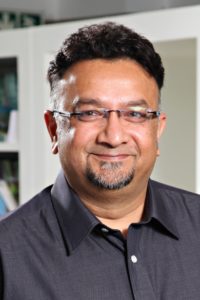 Jayant Bhagwan, is the Executive Manager of the key strategic area of Water Use and Waste Management at the South African Water Research Commission, which focuses on the management of water and wastewater in the Domestic, Mining and Industrial sector. He has been instrumental in creating the portfolio of research projects and innovations related to water supply and wastewater management. He completed his Masters Degree in Tropical Public Health Engineering from Leeds University, UK. With his knowledge and experienced gained in implementation of water and sanitation projects, he has played and participated in the shaping of national water policy and legislation. He held the posts of the President of the Water Institute of Southern Africa, Chairperson of the Minister of Water Affairs and Forestry Water Advisory Committee, as well as international advisory positions with the Water Supply and Sanitation Collaborative Council, IWA- Global Development Agency and UNEP. He continues to be actively involved in a broad range of areas in the field of water supply, wastewater and sanitation, with current focus being on sanitation technologies for the future, technology innovation and application, social franchising of O&M, conduit hydropower, benchmarking, reuse and reclamation of effluents.
Jayant Bhagwan, is the Executive Manager of the key strategic area of Water Use and Waste Management at the South African Water Research Commission, which focuses on the management of water and wastewater in the Domestic, Mining and Industrial sector. He has been instrumental in creating the portfolio of research projects and innovations related to water supply and wastewater management. He completed his Masters Degree in Tropical Public Health Engineering from Leeds University, UK. With his knowledge and experienced gained in implementation of water and sanitation projects, he has played and participated in the shaping of national water policy and legislation. He held the posts of the President of the Water Institute of Southern Africa, Chairperson of the Minister of Water Affairs and Forestry Water Advisory Committee, as well as international advisory positions with the Water Supply and Sanitation Collaborative Council, IWA- Global Development Agency and UNEP. He continues to be actively involved in a broad range of areas in the field of water supply, wastewater and sanitation, with current focus being on sanitation technologies for the future, technology innovation and application, social franchising of O&M, conduit hydropower, benchmarking, reuse and reclamation of effluents.
Recent initiatives of his are Conduit Hydropower Generation from pressurized supply of water as a green solution for energy offsetting and compensation. Urban water sensitive design with the intention of developing an urban water cycle which is much more resilient and less dependent on transfers, using reuse, recycle and recovery options. As part of this the next area is Sanitation Technology Game Changing. Shifting the technology and paradigm from waterborne to off the grid solution dealing with human wastes beneficially at source. Currently, few of these technologies are being scaled up for demonstration in South Africa and is led by Jay. He is also the chair of the IWA specialist group on Non Sewered Sanitation.
John Crump, University of Otago
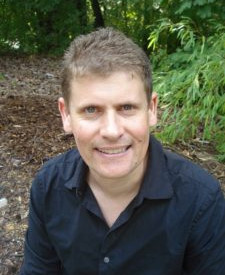 John Crump is McKinlay Professor of Global Health and Co-Director, Centre for International Health, University of Otago, Dunedin; Adjunct Professor of Medicine, Pathology, and Global Health at Duke University; and a Guest Researcher with the US Centers for Disease Control and Prevention. He graduated from the University of Otago Medical School in 1993 and trained as both an internist in infectious diseases and as a pathologist in medical microbiology, training at Christchurch Hospital, New Zealand; the Royal Free Hospital, London; the Canberra Hospital, Australia; Duke University Medical Center; and with the US Centers for Disease Control and Prevention. He is a Fellow of the Royal Australasian College of Physicians, a Fellow of the Royal College of Pathologists of Australasia, a Fellow of the Royal College of Physicians of the United Kingdom, and a diplomate of the London School of Hygiene and Tropical Medicine. His main interests are in the prevention, diagnosis, and treatment of infectious diseases in developing countries, with particular focus on febrile illness; invasive bacterial diseases especially the salmonelloses; bacterial zoonoses; HIV; tuberculosis; and enteric infections.
John Crump is McKinlay Professor of Global Health and Co-Director, Centre for International Health, University of Otago, Dunedin; Adjunct Professor of Medicine, Pathology, and Global Health at Duke University; and a Guest Researcher with the US Centers for Disease Control and Prevention. He graduated from the University of Otago Medical School in 1993 and trained as both an internist in infectious diseases and as a pathologist in medical microbiology, training at Christchurch Hospital, New Zealand; the Royal Free Hospital, London; the Canberra Hospital, Australia; Duke University Medical Center; and with the US Centers for Disease Control and Prevention. He is a Fellow of the Royal Australasian College of Physicians, a Fellow of the Royal College of Pathologists of Australasia, a Fellow of the Royal College of Physicians of the United Kingdom, and a diplomate of the London School of Hygiene and Tropical Medicine. His main interests are in the prevention, diagnosis, and treatment of infectious diseases in developing countries, with particular focus on febrile illness; invasive bacterial diseases especially the salmonelloses; bacterial zoonoses; HIV; tuberculosis; and enteric infections.
Melita Gordon, University of Liverpool
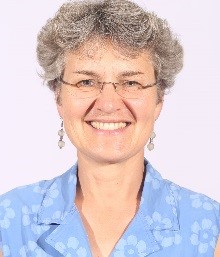 Melita Gordon MA MD FRCP DTM&H is a gastroenterologist and clinical scientist, living in Blantyre, Malawi. She trained in internal medicine in Oxford, Zambia, and Belfast, and in Gastroenterology in Sheffield and Liverpool. She has researched invasive Salmonella disease in Malawi for 19 years, first as a Wellcome Trust Clinical Research Fellow, then during a UKCRC Senior Clinical Lectureship, and currently as Professor of Gastroenterology in the Institute of Infection and Global Health in the University of Liverpool. In 2011 she was awarded the British Society of Gastroenterology’s Sir Francis Avery Jones Research Medal, and in 2012 the Shire SAGE first prize for Excellence in Gastroenterology. Her research encompasses clinical epidemiology and transmission modelling, clinical disease pathogenesis, host peripheral and mucosal cellular and molecular inflammatory response, bacterial phylogenomics. She is deputy director of a Wellcome Trust Clinical PhD Programme and academic lead of a Univerity of Malawi and Liverpool joint PhD registration programme, both developing training young researchers working in low-income settings. She also leads a World Gastroenterology Organization International Training Centre for gastroenterology and GI endoscopy.
Melita Gordon MA MD FRCP DTM&H is a gastroenterologist and clinical scientist, living in Blantyre, Malawi. She trained in internal medicine in Oxford, Zambia, and Belfast, and in Gastroenterology in Sheffield and Liverpool. She has researched invasive Salmonella disease in Malawi for 19 years, first as a Wellcome Trust Clinical Research Fellow, then during a UKCRC Senior Clinical Lectureship, and currently as Professor of Gastroenterology in the Institute of Infection and Global Health in the University of Liverpool. In 2011 she was awarded the British Society of Gastroenterology’s Sir Francis Avery Jones Research Medal, and in 2012 the Shire SAGE first prize for Excellence in Gastroenterology. Her research encompasses clinical epidemiology and transmission modelling, clinical disease pathogenesis, host peripheral and mucosal cellular and molecular inflammatory response, bacterial phylogenomics. She is deputy director of a Wellcome Trust Clinical PhD Programme and academic lead of a Univerity of Malawi and Liverpool joint PhD registration programme, both developing training young researchers working in low-income settings. She also leads a World Gastroenterology Organization International Training Centre for gastroenterology and GI endoscopy.
Sam Kariuki, Kenya Medical Research Institute
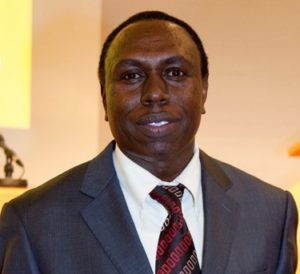 Sam Kariuki is Chief Research Scientist and Director, Research and Development at KEMRI in Nairobi. He is also a Wellcome Trust Sanger Institute International Fellow and a visiting Professor of Tropical Microbiology, Nuffield Department of Medicine, University of Oxford, UK. He is a Fellow of the African Academy of Sciences. Research interests are in epidemiology and genomics of enteric bacterial pathogens and antimicrobial resistance, including invasive non-typhoidal salmonellosis (NTS) and typhoid fever, Shigella spp, Vibrio cholerae and Escherichia coli. He has authored/co-authored over 140 papers in peer-reviewed journals and 3 text books on Antimicrobial Resistance (AMR) and Food Safety. Our data has contributed extensively to policy change in treatment and management of food-borne infections locally and in the region. Sam also serves as World Health Organization consultant on food safety, antimicrobial resistance and infectious disease surveillance for the East Africa Region, and is a member of the WHO Advisory Group for Integrated Surveillance of Antimicrobial Resistance (AGISAR). As a member of the National Antimicrobial Stewardship Advisory Committee providing policy direction for Ministries of Health and Agriculture on Antimicrobial stewardship in human and veterinary medicine and in the implementation of the National Action Plan to combat AMR.
Sam Kariuki is Chief Research Scientist and Director, Research and Development at KEMRI in Nairobi. He is also a Wellcome Trust Sanger Institute International Fellow and a visiting Professor of Tropical Microbiology, Nuffield Department of Medicine, University of Oxford, UK. He is a Fellow of the African Academy of Sciences. Research interests are in epidemiology and genomics of enteric bacterial pathogens and antimicrobial resistance, including invasive non-typhoidal salmonellosis (NTS) and typhoid fever, Shigella spp, Vibrio cholerae and Escherichia coli. He has authored/co-authored over 140 papers in peer-reviewed journals and 3 text books on Antimicrobial Resistance (AMR) and Food Safety. Our data has contributed extensively to policy change in treatment and management of food-borne infections locally and in the region. Sam also serves as World Health Organization consultant on food safety, antimicrobial resistance and infectious disease surveillance for the East Africa Region, and is a member of the WHO Advisory Group for Integrated Surveillance of Antimicrobial Resistance (AGISAR). As a member of the National Antimicrobial Stewardship Advisory Committee providing policy direction for Ministries of Health and Agriculture on Antimicrobial stewardship in human and veterinary medicine and in the implementation of the National Action Plan to combat AMR.
Daniele Lantagne, Tufts University
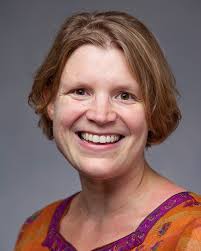
Dr. Daniele Lantagne is a public heath engineer, with training in Environmental Engineering from MIT (1996, 2001) and Infectious Tropical Diseases from London School of Hygiene and Tropical Medicine (2011). She’s an Associate Professor in Civil and Environmental Engineering at Tufts University, and has been working in water, sanitation, and hygiene to reduce the burden of infectious disease since 2000, working at MIT, the Centers for Disease Control and Prevention, LSHTM, Harvard’s Center for International Development, and Tufts. Over the past nineteen years, she provided technical assistance or conducted research in more than 50 countries in Africa, Asia, and Central/South America in both development and emergency contexts. She has published over 60 papers on water supply, water treatment, hygiene and sanitation in low-income contexts. Her main research interest is how to reduce the burden of infectious diseases by understanding the efficacy and effectiveness of water, sanitation, and hygiene interventions. At Tufts, she leads an active research group of post-doctoral scholars and Ph.D. students completing laboratory, field, and policy research with funding from agency, government, NGO, foundation, and private sources.
Florian Marks, International Vaccine Institute
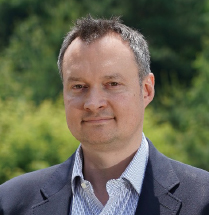 Dr. Florian Marks, MPH, PhD, senior scientist at the International Vaccine Institute (IVI) has over 15 years’ experience in conducting epidemiological studies and provision of technical assistance to low-income countries. As the head of the Epidemiology Unit he oversees epidemiological studies of the institute. His duties include the organization, supervision and management of standardized surveillance studies, vaccination campaigns and associated effectiveness studies to generate scientific data for vaccine introduction recommendations and improvement of existing programs. His expertise is the execution of large, multi-center studies such as the Typhoid Fever Surveillance in Africa Program (TSAP) Program that generated incidence data on invasive bacterial bloodstream infections from 13 African sites; a second stage is currently underway focusing on severe typhoid (Severe Typhoid Surveillance in Africa Program (SETA). In Africa, Dr. Marks has been working in Guinea-Bissau, Senegal, Burkina Faso, Ghana, Sudan, Ethiopia, Kenya, Tanzania, Madagascar, South Africa, DR Congo, Malawi and Nigeria. In Asia, he has instituted antimicrobial resistance surveillance in Vietnam, Cambodia and Bangladesh and conducted vaccination programs in North Korea, Nepal, Indonesia and Vietnam.
Dr. Florian Marks, MPH, PhD, senior scientist at the International Vaccine Institute (IVI) has over 15 years’ experience in conducting epidemiological studies and provision of technical assistance to low-income countries. As the head of the Epidemiology Unit he oversees epidemiological studies of the institute. His duties include the organization, supervision and management of standardized surveillance studies, vaccination campaigns and associated effectiveness studies to generate scientific data for vaccine introduction recommendations and improvement of existing programs. His expertise is the execution of large, multi-center studies such as the Typhoid Fever Surveillance in Africa Program (TSAP) Program that generated incidence data on invasive bacterial bloodstream infections from 13 African sites; a second stage is currently underway focusing on severe typhoid (Severe Typhoid Surveillance in Africa Program (SETA). In Africa, Dr. Marks has been working in Guinea-Bissau, Senegal, Burkina Faso, Ghana, Sudan, Ethiopia, Kenya, Tanzania, Madagascar, South Africa, DR Congo, Malawi and Nigeria. In Asia, he has instituted antimicrobial resistance surveillance in Vietnam, Cambodia and Bangladesh and conducted vaccination programs in North Korea, Nepal, Indonesia and Vietnam.
Christine Moe, Emory University
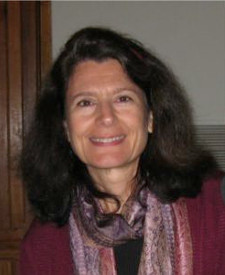 Dr. Moe is the Eugene J. Gangarosa Professor of Safe Water and Sanitation in the Rollins School of Public Health and the Director of the Center for Global Safe Water at Emory University. Her research focuses primarily on the environmental transmission of infectious agents, in particular, foodborne and waterborne diseases. Her field research in Bangladesh, Bolivia, Cambodia, China, El Salvador, Ghana, Honduras, India, Kenya, Mozambique, the Philippines, Rwanda, Uganda and the United States includes studies of diarrheal diseases, dry sanitation systems, fecal contamination in low-income urban environments, water quality in distribution systems, water, sanitation and hygiene in healthcare facilities in low-resource settings, and environmental contamination of vegetable crops. Dr. Moe served on the US Environmental Protection Agency Science Advisory Board and chaired a National Research Council Committee to advise USAID on Grand Challenges in International Development. She has been a consultant for the World Health Organization and the Bill and Melinda Gates Foundation. She has also served on the Water Science and Technology Board of the National Research Council and the Research Advisory Council for the American Water Works Research Foundation. She has received the World Bank Development Marketplace Infrastructure award and the NSF Food Safety Leadership award. Dr. Moe has a BA in Biology from Swarthmore College and MS and PhD in Environmental Sciences from the University of North Carolina at Chapel Hill.
Dr. Moe is the Eugene J. Gangarosa Professor of Safe Water and Sanitation in the Rollins School of Public Health and the Director of the Center for Global Safe Water at Emory University. Her research focuses primarily on the environmental transmission of infectious agents, in particular, foodborne and waterborne diseases. Her field research in Bangladesh, Bolivia, Cambodia, China, El Salvador, Ghana, Honduras, India, Kenya, Mozambique, the Philippines, Rwanda, Uganda and the United States includes studies of diarrheal diseases, dry sanitation systems, fecal contamination in low-income urban environments, water quality in distribution systems, water, sanitation and hygiene in healthcare facilities in low-resource settings, and environmental contamination of vegetable crops. Dr. Moe served on the US Environmental Protection Agency Science Advisory Board and chaired a National Research Council Committee to advise USAID on Grand Challenges in International Development. She has been a consultant for the World Health Organization and the Bill and Melinda Gates Foundation. She has also served on the Water Science and Technology Board of the National Research Council and the Research Advisory Council for the American Water Works Research Foundation. She has received the World Bank Development Marketplace Infrastructure award and the NSF Food Safety Leadership award. Dr. Moe has a BA in Biology from Swarthmore College and MS and PhD in Environmental Sciences from the University of North Carolina at Chapel Hill.
Kathleen Neuzil, University of Maryland School of Medicine
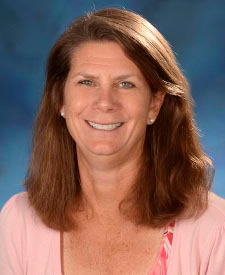 Dr. Kathleen Neuzil is the project director of the Typhoid Vaccine Acceleration Consortium. She is a globally recognized vaccinologist with proficiency ranging from epidemiology, international field trials and vaccine policy, to partnerships with emerging manufacturers and direct experience with Gavi processes, World Health Organization (WHO) policy, and prequalification (PQ). She has led successful multi-year, multi-site, efforts in global health, informing vaccine policy recommendations and catalyzing introductions. She brings a fresh perspective and objective approach necessary to mobilize the field and move typhoid conjugate vaccines (TCVs) forward.
Dr. Kathleen Neuzil is the project director of the Typhoid Vaccine Acceleration Consortium. She is a globally recognized vaccinologist with proficiency ranging from epidemiology, international field trials and vaccine policy, to partnerships with emerging manufacturers and direct experience with Gavi processes, World Health Organization (WHO) policy, and prequalification (PQ). She has led successful multi-year, multi-site, efforts in global health, informing vaccine policy recommendations and catalyzing introductions. She brings a fresh perspective and objective approach necessary to mobilize the field and move typhoid conjugate vaccines (TCVs) forward.
Samir Saha, Child Health Research Foundation
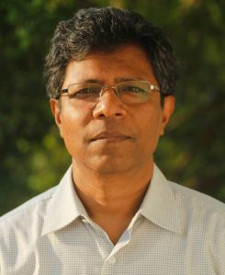 Dr. Samir Saha is the Professor and Head of the Department of Microbiology and the Executive Director of The Child Health Research Foundation at the Bangladesh Institute of Child Health, Dhaka Shishu Hospital in Dhaka, Bangladesh. Dr. Saha is also an associate of the Department of International Health at Johns Hopkins University and adjunct scientist at International Centre for Diarrhoeal and Research, Bangladesh (ICDDR,B). Dr. Saha is currently a member of the National Committee for Immunization Policies of the Government of Bangladesh. He is also a member of WHO Technical Working Group for Vaccine Preventable Diseases surveillance network and Pneumococcus Awareness Council of Experts (PACE). Dr. Saha has published more than 100 papers in peer-reviewed journals, mostly relating to childhood pneumonia and meningitis. He is now conducting several multi-site and multi-country research projects on infectious disease supported by different international funding organizations. In addition to studies on child health, Dr. Saha is also the Principal Investigator of the multi-site and multi-country project on Aetiology of Neonatal Infection in South Asia (ANISA) project, supported by the Bill and Melinda Gates Foundation. The ANISA project is currently being conducted in three South Asian countries and is a major international effort to determine the root causes of community-based neonatal and maternal infection, and develop evidence-based strategies to protect children and mothers in the subcontinent. Dr. Saha earned his MSc. from The University of Dhaka in Bangladesh in 1983, and his PhD from the Institute of Medical Sciences of Banaras Hindu University, Varanasi, India, in 1989.
Dr. Samir Saha is the Professor and Head of the Department of Microbiology and the Executive Director of The Child Health Research Foundation at the Bangladesh Institute of Child Health, Dhaka Shishu Hospital in Dhaka, Bangladesh. Dr. Saha is also an associate of the Department of International Health at Johns Hopkins University and adjunct scientist at International Centre for Diarrhoeal and Research, Bangladesh (ICDDR,B). Dr. Saha is currently a member of the National Committee for Immunization Policies of the Government of Bangladesh. He is also a member of WHO Technical Working Group for Vaccine Preventable Diseases surveillance network and Pneumococcus Awareness Council of Experts (PACE). Dr. Saha has published more than 100 papers in peer-reviewed journals, mostly relating to childhood pneumonia and meningitis. He is now conducting several multi-site and multi-country research projects on infectious disease supported by different international funding organizations. In addition to studies on child health, Dr. Saha is also the Principal Investigator of the multi-site and multi-country project on Aetiology of Neonatal Infection in South Asia (ANISA) project, supported by the Bill and Melinda Gates Foundation. The ANISA project is currently being conducted in three South Asian countries and is a major international effort to determine the root causes of community-based neonatal and maternal infection, and develop evidence-based strategies to protect children and mothers in the subcontinent. Dr. Saha earned his MSc. from The University of Dhaka in Bangladesh in 1983, and his PhD from the Institute of Medical Sciences of Banaras Hindu University, Varanasi, India, in 1989.
Mathuram Santosham, Johns Hopkins University
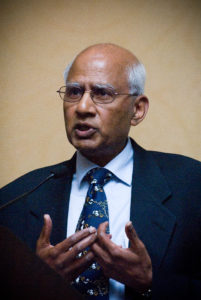 Dr. Mathu Santosham is a Professor in the Departments of International Health and Pediatrics at Johns Hopkins University. He was the Founder and Director of the Johns Hopkins Center for American Indian Health (CAIH) from April 1991 to April 2016. He is currently the Director Emeritus of CAIH. He is also the Senior Advisor for the International Vaccine Access Center (IVAC). Dr. Santosham is internationally known for his work on oral rehydration therapy, childhood vaccines and dissemination of pediatric prophylactics to vulnerable populations worldwide. Working in partnership with Native American communities, he conducted landmark vaccine efficacy trials, including rotavirus vaccine, H. influenzae type b (Hib) conjugate vaccine, and pneumococcal conjugate vaccine. Native American children used to die from these diseases at rates 10 to 50 times the US average. Through his advocacy, these vaccines now save 3 to 5 million lives a year in the US and across the globe. In addition, Dr. Santosham worked with the White Mountain Apache Tribe to pioneer the use of oral rehydration solution (ORS), now known as “Pedialyte” in the US. Based on this evidence, ORS has become the standard of care for treating diarrheal dehydration, and is credited with saving 60 million lives since 1980. Dr. Santosham has become a global leader in the national and international dissemination of these public health strategies worldwide. For his contributions in public health, he has received several awards including: Albert Sabin Gold Medal Award, the Fries Prize for Improving Health and the Prince Mahidol Award for Public Health.
Dr. Mathu Santosham is a Professor in the Departments of International Health and Pediatrics at Johns Hopkins University. He was the Founder and Director of the Johns Hopkins Center for American Indian Health (CAIH) from April 1991 to April 2016. He is currently the Director Emeritus of CAIH. He is also the Senior Advisor for the International Vaccine Access Center (IVAC). Dr. Santosham is internationally known for his work on oral rehydration therapy, childhood vaccines and dissemination of pediatric prophylactics to vulnerable populations worldwide. Working in partnership with Native American communities, he conducted landmark vaccine efficacy trials, including rotavirus vaccine, H. influenzae type b (Hib) conjugate vaccine, and pneumococcal conjugate vaccine. Native American children used to die from these diseases at rates 10 to 50 times the US average. Through his advocacy, these vaccines now save 3 to 5 million lives a year in the US and across the globe. In addition, Dr. Santosham worked with the White Mountain Apache Tribe to pioneer the use of oral rehydration solution (ORS), now known as “Pedialyte” in the US. Based on this evidence, ORS has become the standard of care for treating diarrheal dehydration, and is credited with saving 60 million lives since 1980. Dr. Santosham has become a global leader in the national and international dissemination of these public health strategies worldwide. For his contributions in public health, he has received several awards including: Albert Sabin Gold Medal Award, the Fries Prize for Improving Health and the Prince Mahidol Award for Public Health.


